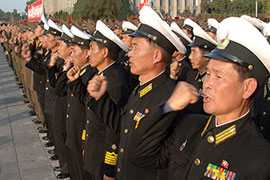US seeks global action on Korea row
US secretary of state calls for “strong” world response to S Korean warship sinking.

“We’re very confident in the South Korean leadership, and their decision about how and when to move forward is one that we respect and will support.”
Severed communication
North Korea has severed key communication links with South Korea in response to the South’s tightening of sanctions against Pyongyang over the deadly torpedoing of the warship in March.
The North shut down communication lines with South Korea between Red Cross authorities on either side of the border and also lines connecting maritime officials, according to Seoul’s unification ministry.
| in depth | |||||||||
|
Al Jazeera’s Tony Birtley, reporting from Seoul, said Clinton’s three to four hour stopover was to show US solidarity with South Korea and to brief officials there on what China – where Clinton had just visited – was saying about the situation.
Pyongyang announced it was freezing ties with the South on Tuesday.
“From now on [the government] will put into force the resolute measures to totally freeze the inter-Korean relations, totally abrogate the agreement on non-aggression between the North and the South and completely halt the inter-Korean co-operation,” the official Korean Central News Agency (KCNA) reported.
However, despite its angry rhetoric North Korean authorities allowed South Korean workers to enter the jointly-run Kaesong industrial park that is a lucrative source of income for the North.
It also did not cut military communication lines which are necessary for the Kaesong operations, Seoul’s unification ministry said.
A spokesman for the ministry said the North had approved the entry of South Korean workers to the Kaesong industrial park, where companies from the South have factories employing some 40,000 low-cost North Korean workers.
The move to let in workers suggested that behind its tough stance, the isolated North was being careful not to take steps that will undermine its already tattered economy.
‘False blame’
The rising tensions came after a report by international investigators last week accused the North, already under international pressure over its nuclear programme, of torpedoing the Cheonan corvette on March 26, killing 46 sailors.
But the North accused South Korea’s government of falsely blaming Pyongyang for the sinking, partly to help the ruling party in local elections due to be held next week.
 |
| North Korea has warned of ‘all-out war’ if it is punished for the sinking of the Cheonan [EPA] |
Pyongyang has said the accusation was tantamount to a declaration of war.
China, the North’s only major ally who in effect bankrolls its economy, has studiously tried to keep out of the fray, urging calm and refusing to voice support for the international report on the Cheonan sinking.
On Wednesday, China’s foreign ministry repeated calls for calm and restraint, with Zhang Zhijun, the vice-foreign minister, saying China had no first-hand information on the sinking.
“We have always believed that dialogue is better than confrontation,” Zhang said.
Most analysts doubt either side would deliberately risk a war, but say there is a serious risk that small skirmishes along the heavily-defended border could turn into broader conflict.
Some worry pushing Kim Jong-il, the North Korean leader, too far may leave him little choice but to fight back to try to save his family’s more than 60-year hold over the destitute country as he tries to secure the leadership succession for his youngest son.
